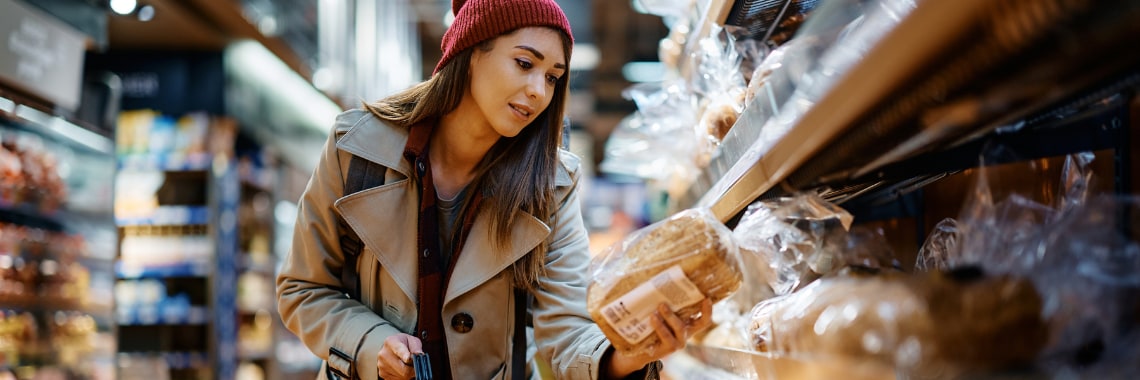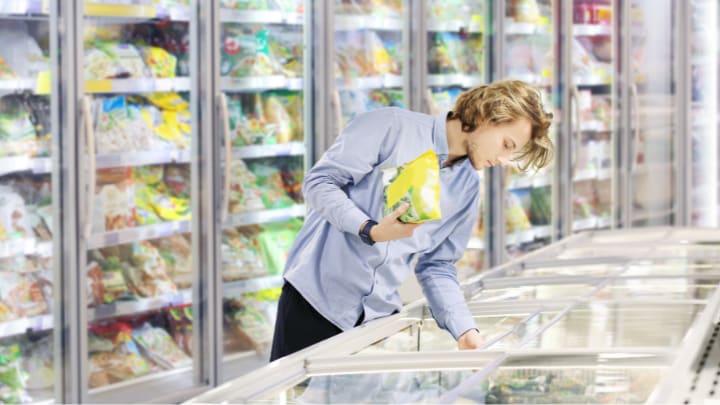Author

Kurt Bischof
Kurt Bischof is globally driving NXP RFID based marketing activities for retailers focusing on Inventory Management and Supply Chain Efficiencies.

See how solutions based on UCODE radio frequency identification (RAIN RFID) chips help grocers cut waste, speed checkout and ensure freshness at scale.
Food and grocery retail is a famously high-volume, low-margin industry. Item variety can range from hundreds in a local convenience store, to tens of thousands in supermarkets. In a global market projected to exceed $14 trillion by 2030, net margins hover between 1% and 3%, leaving little space for operational inefficiencies. That's why grocery retailers of all sizes increasingly turn to enabling automation technologies like the UCODE RAIN RFID chip family. Beyond fast and efficient inventory management, UCODE helps cut waste, accelerate checkout, ensure freshness and protect profit margins.
Consumers are becoming more price-sensitive, with inflation driving down spending, and downtrading as people move from premium to lower-priced products. Premium brands are losing out to private labels, with interest rising in regional products bearing clearly marked origins. Retailers that can meet these expectations are better placed to earn the attention, trust and loyalty of demanding customers.
Delivering high levels of visibility and control means managing inventory at the highest possible granularity: item-level. Manual checks simply cannot keep up when a single store holds 40,000 stock-keeping units (SKUs). RAIN RFID technology provides the automation needed to track freshness, optimize stock and support sourcing transparency. It also opens the door for faster, smarter checkouts, transforming a costly friction point into a seamless retail experience. Fast fashion and sports retailers like Decathlon and UNIQLO have already shown what is possible. Now, it's time grocery stores had a turn.
Discover how to take your operations to the next level. Watch the webinar on RAIN RFID-based labels for food traceability and returnable assets on-demand now.
Your local grocery store is a complex hub of interconnected logistical processes. Thousands of items are in constant motion, from delivery to storage, to shelving, to purchase. As each product must be sold before its expiration date, that 'usability countdown' ticks even faster for fresh goods. Managing this complexity is a major headache for retailers still relying on manual systems to handle thousands of SKUs. Barcode scanning, visual stock-taking and hand-checking expiration dates are all labor-intensive, error-prone processes that sap time, introduce risk, quietly eating away margins.
In all of this, the enemy of growth is shrinkage. Expired goods that cannot be sold, damaged products and missing or stolen items all affect the retailer's bottom line. Which is why solutions based on NXP's UCODE RAIN RFID chips are being put to work in stores around the world, tackling the issues and challenges of inventory management head-on. By enabling supply chain and store-level visibility at item-level, UCODE helps retailers manage inventory with the precision and speed demanded by today's market.

RFID labels based on NXP's UCODE RAIN RFID chips bring automation, precision and speed to grocery operations. By enabling item-level tracking, these ultraefficient passive RAIN RFID chips allow retailers to scan up to 1,000 products per second. Unlike barcodes, line-of-sight visibility isn't required, allowing inventory counts and expiration checks to become faster and more accurate. Even for very big stores, a single handheld RAIN RFID reader can easily tackle inventory scanning and checking.
The UCODE 9 family is built for demanding environments like grocery aisles and chilled storage. With encoding speeds of 32 bits per millisecond and robust memory retention for up to 20 years, these chips provide a dependable foundation for long-term performance. They're also designed to support extended electronic product code (EPC) code sizes, enabling metadata like lot numbers and expiry dates to be written directly onto the tag. Crucially, UCODE chips comply with the GS1 generation 2 version 2 (Gen2V2) standard , making them interoperable with a wide ecosystem of certified RAIN RFID readers and infrastructure. Compliance with standards also helps ensure that retailer investments are protected.
Major retailers are already proving the power of RAIN RFID for tracking freshness in detail. Reaching past retail, Chipotle has taken RAIN RFID into the fast-food space, after a successful 200-restaurant pilot in Chicago. The multinational Mexican grill chain asked all of its suppliers to tag their products with RAIN RFID, boosting visibility and traceability of ingredients across the length of its supply chain. No more time-consuming barcode scanning of stock in transit, now managers can use a simple RAIN RFID reader for instant, accurate results. The company is in the final stages of a national rollout, aiming to bring item-level traceability to each of its 3,500 U.S. locations.
And Kroger, one of the largest grocery chains in the U.S., has now implemented RAIN RFID across several of its in-store bakeries to monitor freshness and reduce waste. According to Avery Dennison , Kroger is now tagging items like bread, muffins and cookies with RAIN RFID labels, providing significant time savings and valuable data to automate inventory freshness management. This, they confirm, is a foundational step in delivering a more seamless customer and associate experience across all fresh categories long-term.
As pressure mounts across the grocery sector, automation has become a competitive necessity. By enabling real-time, item-level visibility and operational agility, UCODE RAIN RFID helps retailers meet today's complexity with clarity and control. The result: fresher products, fewer losses, faster checkouts and would improved margins. One scan, one shelf, thousands of items at a time.
See how UCODE RAIN RFID can enable retail automation and help grocery retailers reduce waste, boost efficiency and protect profit. Explore further at NXP - Retail Automation.
Tags: Industrial

Globally Driving RFID Based Marketing, NXP Semiconductors
Kurt Bischof is globally driving NXP RFID based marketing activities for retailers focusing on Inventory Management and Supply Chain Efficiencies.